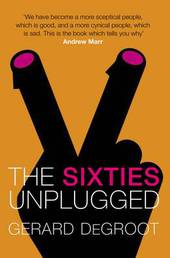
|
The Sixties Unplugged: A Kaleidoscopic History of a Disorderly Decade
Paperback
Main Details
| Title |
The Sixties Unplugged: A Kaleidoscopic History of a Disorderly Decade
|
| Authors and Contributors |
By (author) Gerard DeGroot
|
| Physical Properties |
| Format:Paperback | | Pages:544 | | Dimensions(mm): Height 234,Width 153 |
|
| Category/Genre | World history |
|---|
| ISBN/Barcode |
9781447249108
|
| Classifications | Dewey:909.826 |
|---|
| Audience | |
|---|
| Edition |
Unabridged edition
|
|
Publishing Details |
| Publisher |
Pan Macmillan
|
| Imprint |
Pan Books
|
| Publication Date |
1 August 2013 |
| Publication Country |
United Kingdom
|
Description
The 1960s is a decade often seen through a rose-tinted lens: an era when the young would not only rule the world but change it, too, for the better. But does such fond nostalgia really stand up? Vivid, rich in anecdote, sometimes angry and always persuasive, The Sixties Unplugged is a hugely entertaining and authoritative account of the decade of myth and madness. Read it and remember that even if you weren't there, you can still find out what really happened.
Author Biography
Gerard DeGroot is a Professor of Modern History at the University of St Andrew's, where he has taught since 1985. An American by birth, he came to Britain in 1980 to do a Ph.D. at Edinburgh University. He is the author of ten highly acclaimed books on twentieth-century history and has published widely in academic journals and in the popular press. His study of the atomic bomb, The Bomb: A Life, won the RUSI Westminster Medal, awarded in Britain to the best book published in the English language on a war or military topic.
Reviews'A fabulous history of the decade that lacks the usual nostalgia. Gerard DeGroot explores the period with all its horrors from the Chinese Cultural Revolution to the failure of the super powers in the Six-Day War. He does catalogue the free love and flower power festivals but in sharp contrast to the ethnic cleansing in Jakarta and the real threat of nuclear war. This is a really important book to put perspective on such a formative decade and remove some of the romance.' The Bookseller
|